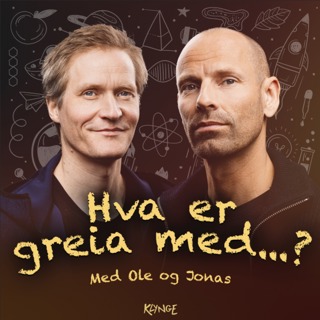
Quantum Computing: Peter Zoller and Ignacio Cirac on the Quantum Revolution
In this episode of the 632-nanometer podcast, we explore the evolution of quantum computing with theoretical physicists and experimentalists Peter Zoller and Ignacio Cirac, two pioneers in the field. They recount their personal journeys and discuss key breakthroughs in the development of trapped ion quantum computing.What are the fundamental challenges of quantum computing, and how did researchers overcome them? What detection methods were initially considered, and how has the approach evolved? In this podcast, you'll find the answers to these questions and learn about significant milestones, including the early experiments by Dave Wineland and Chris Monroe, as well as the role of fault-tolerant quantum computing and error correction in shaping the future of this technology.We also discuss the commercialization of quantum computing, its potential applications, and the future opportunities it presents for young scientists. Zoller and Cirac address foundational questions about quantum physics, the broader implications of their work for science and technology, and share strategic advice for aspiring researchers entering the field.01:33 The Meeting of Minds: How We Met02:19 Early Collaborations and Research03:35 The Birth of Trapped Ion Quantum Computing05:51 Challenges and Innovations in Quantum Computing08:47 The Role of Atomic Clocks and Other Systems15:20 Overcoming Skepticism and Technical Hurdles21:28 Advancements and Future Directions36:38 Exploring Magnetic Field Gradients in Quantum Computing37:00 NMR vs. Ion Trap Quantum Computing37:40 Reflecting on Influential Papers and Collaborations38:48 Quantum Simulators and Optical Lattices40:50 Quantum Communication and Entanglement47:42 Solid State vs. AMO Systems53:49 The Future of Quantum Computing01:02:54 Philosophical and Speculative Questions in Quantum PhysicsFOLLOW US ON SOCIAL:Twitter @ https://x.com/632nmPodcastSubstack: https://632nmpodcast.substack.com/Michael Dubrovsky @ https://x.com/MikeDubrovskyMisha Shalaginov @ https://x.com/MYShalaginovXinghui Yin @ https://x.com/XinghuiYinSUBSCRIBE:Apple Podcasts: https://podcasts.apple.com/us/podcast/632nm/id1751170269Spotify: https://open.spotify.com/show/4aVH9vT5qp5UUUvQ6Uf6ORWEBSITE:https://www.632nm.com
4 Nov 20241h 16min

Gravitational Waves: Rainer Weiss (Nobel Prize 2017) on Laser Interferometer Observation
In 1916, Einstein predicted the existence of gravitational waves, however, it took almost a century for researchers to detect them. In this episode of the 632-nanometer podcast, the team has a fireside chat with Rainer Weiss, the man behind the Laser Interferometer Gravitational-wave Observatory and winner of the Nobel Prize in Physics for the observation of gravitational waves. What are gravitational waves, where do they come from, and why are they so difficult to detect? What detection approaches were considered and how did they eventually succeed? In this podcast, you will find the answers to these questions and hear many other insights from Rainer Weiss about science and life in general. We also discuss space-time distortion, Einstein's theories, the evolution of black hole theory, the pioneering efforts of Joseph Weber, the limitations of early detection methods, the discovery of the interferometry approach, the significance of inflation, technological challenges faced by current detectors like LISA, the role of Richard Isaacson in securing LIGO's success, proposals for moon-based colliders, the role of AI in physics, the operational and financial challenges in large-scale scientific projects, and lots of strategic advice for future researchers.01:26 Explaining Gravitational Waves02:06 Challenges in Measuring Gravitational Waves04:21 Einstein's Predictions and Misconceptions08:12 The Role of Black Holes in Gravitational Waves21:00 Historical Experiments and Controversies41:54 Exploring Vacuum Fluctuations42:41 A Personal Story: Leaving MIT43:27 Dream Physics Experiment44:20 Understanding Inflation and Gravitational Waves46:36 Challenges in Gravitational Wave Detection52:22 The Role of Richard Isaacson in LIGO's Success56:06 Engineering Marvels of LIGO01:19:02 Philosophical Reflections and Future ProspectsFOLLOW US ON SOCIAL:Twitter @ https://x.com/632nmPodcastSubstack: https://632nmpodcast.substack.com/Michael Dubrovsky @ https://x.com/MikeDubrovskyMisha Shalaginov @ https://x.com/MYShalaginovXinghui Yin @ https://x.com/XinghuiYinSUBSCRIBE:Apple Podcasts: https://podcasts.apple.com/us/podcast/632nm/id1751170269Spotify: https://open.spotify.com/show/4aVH9vT5qp5UUUvQ6Uf6ORWEBSITE:https://www.632nm.com
28 Okt 20241h 21min

Synthetic Biology: George Church on Genome Sequencing and De-Extinction
The great George Church takes us through the revolutionary journey of DNA sequencing from his early groundbreaking work to the latest advancements. He discusses the evolution of sequencing methods, including molecular multiplexing, and their implications for understanding and combating aging. We talk about the rise of biotech startups, potential future directions in genome sequencing, the role of precise gene therapies, the ongoing integration of nanotechnology and biology, the potential of biological engineering in accelerating evolution, transhumanism, the Human Genome Project, and the importance of intellectual property in biotechnology. The episode concludes with reflections on future technologies, the importance of academia in fostering innovation, and the need for scalable developments in biotech.02:38 Innovations in DNA Sequencing03:15 The Evolution of Sequencing Methods07:41 Longevity and Aging Reversal12:12 Biotech Startups and Commercial Endeavors17:38 Future Directions in Genome Sequencing28:10 Humanity's Role and Transhumanism37:23 Exploring the Connectome and Neural Networks38:29 The Mystery of Life: From Atoms to Living Systems39:35 Accelerating Evolution and Biological Engineering41:37 Merging Nanotechnology and Biology45:00 The Future of Biotech and Young Innovators47:16 The Human Genome Project: Successes and Shortcomings01:01:10 Intellectual Property in Biotechnology01:06:30 Future Technologies and Final ThoughtsFOLLOW US ON SOCIAL:Twitter @ https://x.com/632nmPodcastSubstack: https://632nmpodcast.substack.com/Michael Dubrovsky @ https://x.com/MikeDubrovskyMisha Shalaginov @ https://x.com/MYShalaginovXinghui Yin @ https://x.com/XinghuiYinSUBSCRIBE:Apple Podcasts: https://podcasts.apple.com/us/podcast/632nm/id1751170269Spotify: https://open.spotify.com/show/4aVH9vT5qp5UUUvQ6Uf6ORWEBSITE:https://www.632nm.com
22 Okt 20241h 10min




















